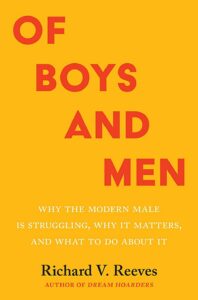 By Richard Reeves
By Richard Reeves
Males increasingly struggle in school, work and families. The reasons are varied and somewhat mysterious, says author Richard Reeves, who proposes, among other things, “a simple but radical reform:” redshirt the boys.
 Perhaps it is not surprising that advantaged white families (and teachers) are most likely to hold back their sons, who reap additional advantages by starting school a year later than the girls. In Of Boys and Men, Reeves points to gender differences in brain development and suggests a staggered start should be the default rather than an option for some families. He deftly counters arguments about increased child-care costs and delayed workforce entry. (1)
Perhaps it is not surprising that advantaged white families (and teachers) are most likely to hold back their sons, who reap additional advantages by starting school a year later than the girls. In Of Boys and Men, Reeves points to gender differences in brain development and suggests a staggered start should be the default rather than an option for some families. He deftly counters arguments about increased child-care costs and delayed workforce entry. (1)
The benefits aren’t so much that boys arrive at kindergarten later, but that they get to middle and high school with the maturity that sets them up for a chain reaction of successes.
Reeves, who works on equality issues at the Brookings Institute, a nonpartisan think-tank, acknowledges that worrying about boys goes against a liberal worldview. He makes a strong case, however, that gender inequalities go both ways—just not in the same ways. And he provides evidence that black boys and men, who face the double hurdle of race and gender inequalities, are impacted most.
Reeves provides stark examples of gender imbalances on measures of well-being: men are significantly more likely than women to live apart from their children and to die by suicide or overdose. Of every 100 bachelor’s degrees earned by women, only 74 are earned by men. Again and again, policy initiatives such as free college show large gains for women and none for men. No one knows exactly why, though Reeves has some thoughts.
He argues that the problems are structural–not due to the shortcomings of individual men. He advocates retiring the term “toxic masculinity,” which suggests something inherently wrong with men. Tougher to knock down are entrenched political barriers. Progressive won’t acknowledge documented gender differences or the challenges faced by men, while conservatives hold up as the only viable solution a return to rigid, outdated gender roles.
Reeves’ recommendations center on education, work and family life. In addition to boys starting school later and investing more in vocational education, he proposes an aggressive effort to recruit male teachers. Men make up just 24% of elementary teachers, compared to a third in the 1980s. Only 3% of preschool and kindergarten teachers are men.
Reeves’ recruitment ideas are part of a larger agenda to steer men toward work in what he calls HEAL professions: health, education, administration and literacy.
One of the most interesting charts in the book shows a reservoir of untapped potential for overcoming gender stereotypes in the workplace. While “natural preferences” tend to compel women into “caring professions” and men into science, technology, engineering and math (STEM), there is a significant (47%) overlap in interests. Social expectations and biases are what discourage a large number of men who might otherwise choose HEAL professions. Reeves says the same kind of effort and expenditures that have led a growing number of women in STEM professions could be marshaled to interest more men in HEAL jobs.
Other policy changes, such as child-support and parental-leave reforms, are needed to acknowledge and support the roles of fathers in families. While men no longer tend to be sole providers, they instruct and protect children. It is typically fathers who encourage boys to take socially appropriate risks and to stand up for themselves, especially in adolescence.
Reeves says society must once again rethink how it views gender and the roles of men and women. “We need a prosocial masculinity for a postfeminist world.”
(1) A kindergarten teacher interviewed elsewhere in this issue pointed out that government-mandated discrimination based on gender cannot be the solution. Instead of singling out boys for a default late-start in school, universal preschool might be a better approach. He also advocates more study about the role of gender as a factor in academic achievement.
Margaret Thomas is a retired college librarian who lives in Tumwater.
Be First to Comment